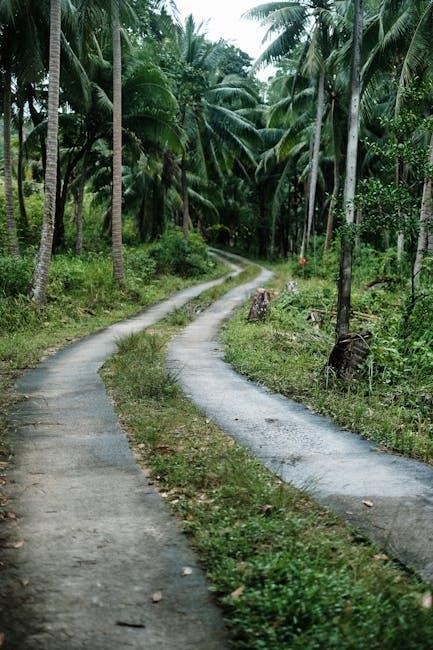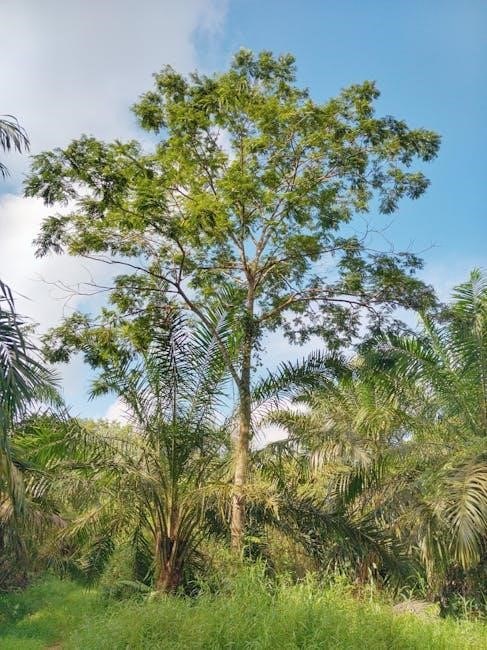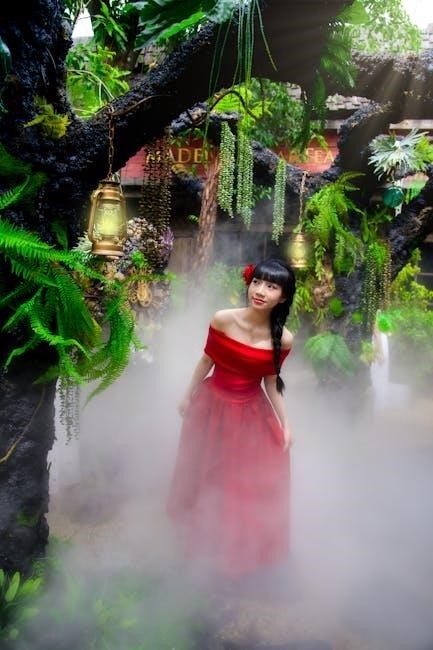The Jungle, written by Upton Sinclair, is a groundbreaking novel exposing the harsh realities of the early 20th-century meatpacking industry in Chicago.

1.1 Historical Context and Background
The Jungle, written by Upton Sinclair in 1906, is set against the backdrop of the early 20th century, a time of rapid industrialization in the United States. The novel vividly portrays the harsh living and working conditions faced by immigrant workers in Chicago’s meatpacking industry. During this period, thousands of immigrants, lured by the promise of the American Dream, found themselves trapped in exploitative labor practices. Sinclair’s work was inspired by his investigative journalism, exposing the brutal realities of capitalism and the plight of the working class. The novel became a catalyst for social change, highlighting the need for labor reforms and improved workplace safety. Its historical significance lies in its unflinching depiction of the era’s socio-economic struggles.
1.2 Overview of Upton Sinclair and His Work
Upton Sinclair was a renowned American author, journalist, and political activist, best known for his muckraking works that exposed social injustices. Born in 1878, Sinclair began his writing career at a young age, producing novels and essays that often criticized capitalism. His most famous work, The Jungle, published in 1906, not only revealed the horrors of the meatpacking industry but also sparked significant reforms. Sinclair’s writings were deeply influenced by his socialist beliefs, and he remained a vocal advocate for workers’ rights throughout his life. His literary contributions have left a lasting impact on American literature and continue to be studied for their historical and social relevance.

Plot and Characters
The Jungle follows Jurgis and his family as they seek a better life in Chicago, detailing their struggles in the harsh meatpacking industry and the exploitation they endure.
2.1 The Struggle of Immigrant Workers in Chicago
Immigrant workers in Chicago faced immense challenges, as depicted in The Jungle. They endured poor working conditions, long hours, and minimal wages, with little legal protection. The novel highlights the exploitation of these laborers, who were lured by the promise of the American Dream but instead found themselves trapped in a cycle of poverty and despair. Sinclair vividly portrays the harsh realities of their daily lives, emphasizing the physical and emotional toll of their struggles. This exposure shocked the public and led to significant reforms, making The Jungle a pivotal work in the fight for workers’ rights.
2.2 The Protagonist Jurgis and His Family’s Journey
Jurgis Rudkus, the protagonist of The Jungle, immigrates to Chicago with his family, seeking the American Dream. Their journey is marked by hope and resilience, but they soon face devastating realities. Jurgis, a strong and determined man, endures brutal working conditions in the meatpacking industry, while his family struggles with poverty, illness, and loss. Sinclair uses Jurgis’s story to illustrate the systemic exploitation of immigrant workers and the disintegration of their dreams. Through Jurgis’s experiences, the novel conveys the emotional and physical toll of their hardships, ultimately leading to a transformation in his perspective and a shift toward socialism. This journey remains a powerful critique of early 20th-century capitalism.

Themes and Symbolism
The Jungle explores themes of exploitation, poverty, and the struggle for justice, symbolizing the harsh realities of capitalism through the plight of immigrant workers in Chicago.
3.1 The Harsh Realities of the Meatpacking Industry
The Jungle vividly portrays the exploitative and unsanitary conditions of Chicago’s meatpacking industry in the early 1900s. Workers endured long hours, low wages, and dangerous environments, often suffering severe injuries. The novel exposes the grim reality of diseased meat being processed and sold, highlighting the industry’s disregard for consumer health. Sinclair’s depiction of the factories reveals a system driven by profit, where workers were treated as disposable. The harsh conditions and lack of regulation led to widespread suffering, both physically and emotionally, among the laborers. These revelations shocked the public and spurred calls for reform, making The Jungle a pivotal work in exposing industrial abuses.
The Jungle by Upton Sinclair centers on the clash between socialism and capitalism, vividly illustrating the exploitation of workers under capitalist systems. The novel portrays the struggles of immigrant workers in Chicago, highlighting how capitalism prioritizes profit over people. Sinclair critiques the dehumanizing effects of industrial capitalism, where workers are reduced to mere commodities. In contrast, socialism is presented as a potential solution, offering a more equitable society. Through Jurgis’s journey, Sinclair advocating for collective action and systemic change, emphasizing the need for a shift from capitalist exploitation to socialist ideals. This central conflict underscores the novel’s purpose as a call to action for social and economic reform. Upton Sinclair, a prominent muckraker, exposed societal injustices through his writing. The Jungle revealed the harsh realities of the meatpacking industry, aiming to provoke reform and raise public awareness of workers’ exploitation, while advocating for socialist ideals to address capitalism’s flaws. Upton Sinclair wrote The Jungle to expose the exploitation of immigrant workers in Chicago’s meatpacking industry. His primary goal was to reveal the harsh working conditions, unsanitary practices, and the systemic oppression faced by laborers. Sinclair aimed to provoke public outrage and advocate for socialist reforms. By depicting the struggles of Jurgis and his family, he highlighted the human cost of capitalism’s excesses. The novel was not just a critique of the industry but a call to action for social change, intending to inspire readers to support labor rights and challenge the capitalist system. Sinclair’s purpose was to educate and agitate, using storytelling as a powerful tool for reform. Muckraking journalism, exemplified by Upton Sinclair’s The Jungle, had a profound impact on public awareness and policy change. Sinclair’s exposé revealed the horrifying conditions in Chicago’s meatpacking industry, sparking widespread outrage. The graphic descriptions of unsanitary practices and worker exploitation led to a national scandal, prompting President Theodore Roosevelt to launch investigations. This resulted in the passage of the Meat Inspection Act of 1906 and the Pure Food and Drug Act, which revolutionized food safety regulations. Sinclair’s work demonstrated the power of investigative journalism to drive reform and hold industries accountable. His muckraking legacy continues to inspire journalists and advocates for social justice, showcasing the enduring influence of courageous reporting. The novel remains a landmark in the fight for labor rights and consumer protection. The Jungle sparked significant societal change by exposing the meatpacking industry’s atrocities, leading to reforms and heightened public awareness of labor rights and consumer protections. The publication of The Jungle in 1906 ignited widespread outrage and scandal. The graphic depiction of unsanitary conditions and worker exploitation in Chicago’s meatpacking plants horrified the public. Readers were particularly disturbed by descriptions of rotting meat and diseased animals being processed for consumption. This led to a national uproar, with many demanding immediate reforms. The scandal also drew attention to the plight of immigrant workers, highlighting their poor working conditions and low wages. Sinclair’s exposé became a catalyst for change. The Jungle sparked immediate political action, leading to the passage of the Meat Inspection Act of 1906. President Theodore Roosevelt, influenced by Sinclair’s exposé, pushed for federal oversight of the industry. The Act mandated rigorous inspections of meatpacking plants and ensured safer food production. It also led to reforms in labor practices, improving working conditions for thousands of immigrant workers. While Sinclair’s goal was to advocate for socialism, the public outcry focused on food safety, prompting these landmark changes. The novel’s impact extended beyond literature, reshaping industry regulations and setting a precedent for future consumer protections. The Jungle remains a cornerstone of American literature, inspiring reforms and raising awareness about social injustices. Its impact continues to resonate, making it a timeless classic. The Jungle by Upton Sinclair remains highly relevant today, as its themes of income inequality, workers’ rights, and corporate ethics continue to resonate. The novel’s depiction of exploitation in the meatpacking industry parallels modern concerns about labor practices and workplace safety. Its critique of capitalism and advocacy for socialism also align with contemporary debates on economic systems. Additionally, the struggles of immigrant workers in the early 20th century mirror current issues faced by marginalized communities. The novel’s enduring impact highlights its ability to serve as a lens for analyzing modern societal challenges, making it a vital read for understanding historical and contemporary social justice issues. The Jungle by Upton Sinclair profoundly influenced American literature and society by pioneering muckraking journalism. Its exposé of the meatpacking industry shocked the nation, leading to the 1906 Meat Inspection Act and regulatory reforms. The novel’s vivid portrayal of worker exploitation and unsanitary conditions sparked public outrage, shifting societal attitudes toward labor rights and corporate accountability. It inspired a wave of investigative journalism and social realism in literature. Sinclair’s work became a landmark in American literary history, encouraging authors to address social injustices. The novel’s impact extended beyond literature, fostering significant political and cultural changes, cementing its legacy as a powerful catalyst for reform and a cornerstone of American literary activism. Its influence remains evident in contemporary debates on labor and ethics. The Jungle by Upton Sinclair is widely available in PDF format. Reliable sources include university libraries, such as the University of Toronto, which offers a scanned 1906 edition. Many websites provide free, legal downloads, as the novel is in the public domain. Readers can access it through platforms like Google Books or Project Gutenberg, ensuring easy and lawful access to this classic work. Reliable PDF versions of Upton Sinclair’s “The Jungle” can be found through reputable sources. University libraries, such as the University of Toronto, offer scanned editions for academic use. Additionally, digital archives like Project Gutenberg and Google Books provide free, legal downloads of the novel. Many websites specializing in classic literature also offer high-quality PDF versions. To ensure authenticity, look for versions hosted by trusted educational institutions or well-known digital libraries. These sources guarantee that the text is accurate and free from copyright issues, making it easy for readers to access and study this important work. Always verify the source to avoid downloading unauthorized or altered versions. Legal and free PDF versions of Upton Sinclair’s “The Jungle” can be downloaded from various reputable sources. Websites like Project Gutenberg, ManyBooks, and Internet Archive offer free access to the novel in PDF format. These platforms specialize in hosting classic literature that is now in the public domain, ensuring legal downloading. Additionally, some university libraries and educational websites provide free PDF versions for academic purposes. When downloading, always verify the source to ensure the file is authentic and free from copyright infringement. These resources make it easy for readers to access and study The Jungle without any legal concerns, promoting educational and personal enrichment. Study guides for Upton Sinclair’s “The Jungle” are widely available online, offering insights into themes, characters, and historical context. Resources like SparkNotes and CliffsNotes provide detailed analyses and study aids. Additionally, educational platforms offer downloadable PDF guides with summaries, discussion questions, and essay prompts to enhance understanding and analysis of the novel. Analytical tools for Upton Sinclair’s “The Jungle” include detailed character maps, theme trackers, and critical essays. These tools help readers dissect the novel’s complex themes, such as socialism vs. capitalism, and its vivid portrayal of the meatpacking industry. SparkNotes and CliffsNotes offer comprehensive guides with chapter summaries, analysis of motifs, and historical context. Additionally, educational platforms provide downloadable PDF resources, including discussion questions and essay prompts, to deepen understanding. These tools are invaluable for students and scholars aiming to explore the novel’s literary and historical significance thoroughly. Educational resources for students studying Upton Sinclair’s “The Jungle” include study guides, PDF versions of the novel, and teaching materials. Platforms like SparkNotes and CliffsNotes provide detailed analyses, chapter summaries, and essay prompts. Many schools offer downloadable PDF guides that highlight themes, motifs, and character development. Additionally, Think Digital Academy and other online platforms provide interactive tools to enhance understanding. These resources are designed to help students grasp the novel’s historical context, its critique of capitalism, and its literary significance. They also assist with essay writing and preparation for class discussions, making them invaluable for academic success.3.2 Socialism vs. Capitalism: The Central Conflict

Upton Sinclair’s Role as a Muckraker
4.1 The Purpose Behind Writing “The Jungle”
4.2 The Impact of Muckraking Journalism
Social and Political Impact
5.1 The Public Reaction and Scandal
5.2 The Meat Inspection Act and Subsequent Reforms

Legacy of the Novel

6.1 Continued Relevance in Modern Times
6.2 Influence on American Literature and Society

Accessing “The Jungle” in PDF Format
7.1 Where to Find Reliable PDF Versions
7.2 Legal and Free Sources for Download
Study Guides and Resources
8.1 Analytical Tools for Understanding the Novel
8.2 Educational Resources for Students
